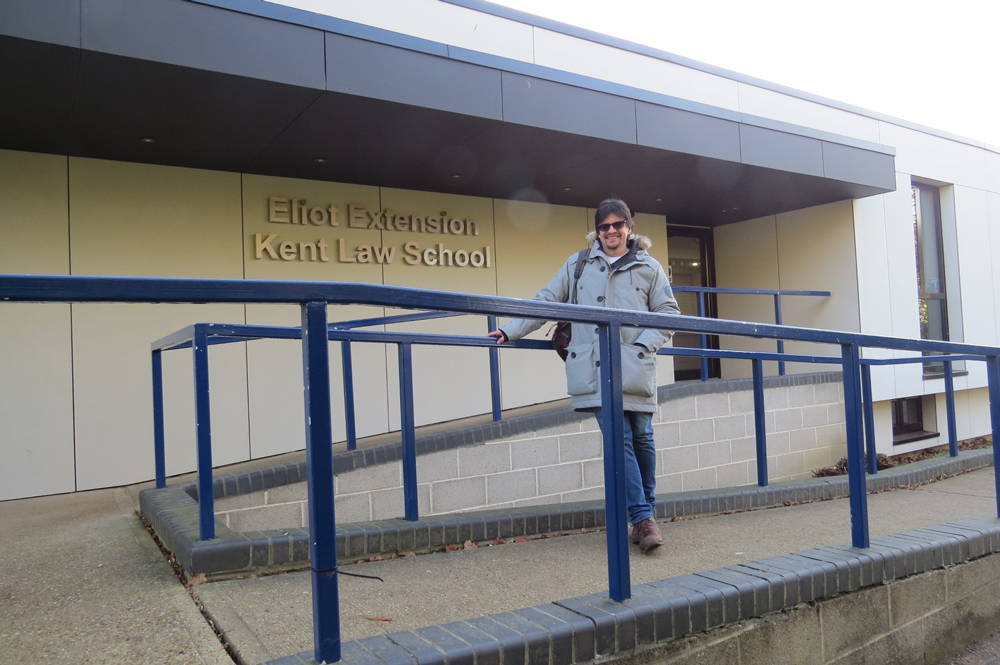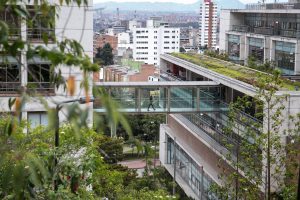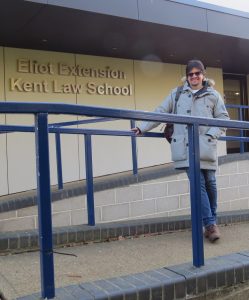Colombian PhD legal scholar Diego Peña is the first to benefit from a new international exchange agreement between Kent Law School and the Universidad de los Andes (Los Andes) in Bogotá DC.
The reciprocal agreement enables up to three doctoral research students from each institution to study at the partner institution for a period of six to 12 months. It was instigated by Kent Law School Senior Lecturer Dr Luis Eslava with support from the Law School’s Co-Director of Postgraduate Research Professor Donatella Alessandrini, Director of International Programmes Lisa Dickson and Law Lecturer Dr Rose Sydney Parfitt.
Both Kent and Los Andes also share a commitment to promote academic staff mobility opportunities and the development and consolidation of research networks with a view to developing collaborative teaching, joint research projects and joint conferences and seminars.
Diego was keen to take advantage of the opportunity to engage with Kent Law School’s distinctive critical approach to socio-legal research and arrived in September to work under the supervision of Dr Eslava. Diego said: ‘Kent was very attractive to me because I was trying to introduce a critical approach to my thesis. Additionally, I had read a book by Dr Eslava that was very stimulating and useful. He studies the links between local urban development and international law in developing countries that takes Bogotá as an example.’
Diego’s thesis is a study of the relationship between urban policy and public law in three Latin American cities: São Paulo, Santiago de Chile and Bogotá. The provisional title is ‘Autoimmune Bureaucracy and Urban Space: Three Latin American Contexts.’ (Read more about Diego’s research – and his experience of coming to study at Kent Law School – in his student profile below.)
This latest international exchange agreement is the third to be made available to PhD scholars at Kent Law School; an agreement signed in May 2017 between Kent Law School and the University of Melbourne was also the first PhD student exchange agreement to be made available at Kent. Kent Law School signed an earlier partnership agreement in 2015 with the Law Faculty of the Universidade Federal de Minas Gerais (UFMG) in Belo Horizonte.
The Law School is a dynamic and cosmopolitan centre of world-leading research; in the Research Excellence Framework (REF 2014), the Law School was ranked 8th in the UK for research intensity and was ranked within the top 20 for research output, research quality and research impact. It is also ranked amongst the top 100 law schools in the world in both the QS World University Rankings by Subject 2017 and the Shanghai Ranking’s Global Ranking of Academic Subjects 2017.
Los Andes University was founded in 1948 and is the only Colombian private university to have received Institutional Accreditation from the Ministry of National Education for nine years. It has been ranked in the QS World University Rankings 2016 as the best university in Colombia, 7th in Latin America and 283rd in the world.
Research degree programmes offered at Kent’s Canterbury campus include: Law – LLM, MPhil; Law – PhD; and Socio-legal Studies – LLM, MPhil, Phd. A specialist PhD Programme in Law is also available at the University’s centre in Brussels. Applications are currently open for full time studentships for postgraduate research degrees in law beginning at Kent’s Canterbury campus in September 2018.
International exchange student profile: PhD legal scholar Diego Peña
Can you tell us about the research you have been doing during your time at Kent?
I have done two basic activities. First, I have been working on the first part of my thesis. In this section, I am going to present my theoretical approach and the central argument. Dr Eslava has helped me a lot in this aspect. We have held very interesting and productive meetings about the main purpose of my work and the core of the proposal. Additionally, he has recommended some interesting readings with a critical emphasis. Based on this, I have made advances with the introduction to my thesis and have a clearer idea of the next steps. The other activity I have been involved in is the research of literature on urban development in England. Now it is easier for me to understand the differences and similarities between this country and Colombia. I hope to have the opportunity to deepen this issue in the future. And finally, I have been assisting with some classes and seminars at Kent where it’s been possible to get to know its warm environment and the pedagogic system.
How has your time at Kent helped/influenced the development of your thesis?
One of the most important steps of my research, and maybe the most difficult, has been the beginning of the writing. The time at Kent has been vital to take that step. I had made progress in Colombia with help of Mauricio Rengifo, my supervisor there, and I had the extraordinary opportunity to travel to São Paulo and Santiago this year to gather information. However, until now, I had not been able to put the first word in writing. The environment at Kent, a methodological class that I was able to take and, especially, the support of Dr Eslava, has allowed me to make progress not only with the elucidation of the aims of my thesis but also in writing the introduction. I needed a push to release the first ideas and express them on paper. Fortunately, all the opportunities here at Kent enabled me to receive that boost. Now, the path towards the finalisation of the work is clearer, and its elaboration is more fluent and enjoyable.
And how are you finding life in Canterbury (and the UK)?
I live in Bogotá (Colombia), a city that is very big and a little bit chaotic. I am not very sure why, but I love it. I guess it is because when you live in such a context you must learn to appreciate the charm of the chaos. However, if you live in Canterbury it is impossible not to fall in love with its beautiful architecture and landscape, its tranquility, and its order. I came here with my wife and my son, and we have enjoyed the city a lot. We feel very privileged to have had the opportunity to live here and to know its kind people. It is a unique place in the world and we never will forget our months here.
Would you recommend this exchange programme to other PhD scholars?
Absolutely yes. This experience has changed not only my perspective as a scholar but also my entire life. My expectations have been widely surpassed. Academic life here is vibrant and all members of the Postgraduate Research team have an unconditional disposition to make this experience gratifying and useful. I have found a very diverse space of research here and, therefore, I am sure that any student from my University or my country would have a fantastic experience here.
You will soon be returning to Bogotá DC – when do you hope to complete your studies?
I hope to finish my thesis by the end of September and defend it in October.
Can you tell us about any future career plans you may have?
I would like to continue my career as a scholar, teaching and researching in my country. However, it has been very important in my life to combine my scholarly activities with the practical. Therefore, I hope to work again with the national or local government in my country and contribute to debates on urban policy in Colombia and Latin America.



